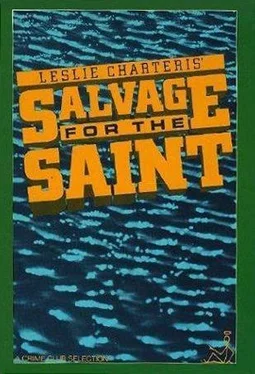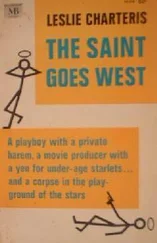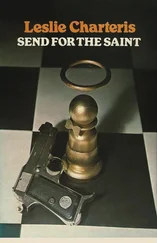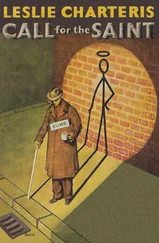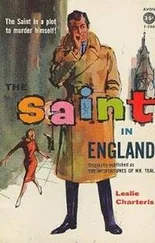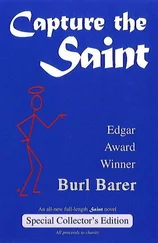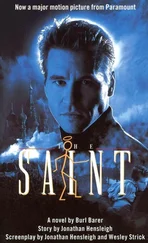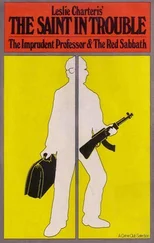It was the missing nautical chart number eighteen.
“Well, well,” Simon said quietly. “Here it is — the bay where the fishing, I’ll warrant, may be the best in all Corsica.”
Arabella squinted down at the chart.
“What are those pencil lines and whatnot?”
“Seventy-three degrees — white villa,” the Saint read. “Three hundred and forty-eight degrees — lighthouse... They’re bearings on shore landmarks, taken from the sea.”
“So the point where they intersect...”
“... must be where the gold is,” Simon finished.
“Bravo!” boomed out the voice of Jacques Descartes from behind them. “Excellent work. I congratulate you both!”
By the middle of the morning the Phoenix lay anchor in a very small and very blue bay in the deeply indented south-west coast of Corsica, and Captain William Finnegan had gone to his bed clutching a newly replenished flask of his favourite spirituous comfort.
During breakfast, the Saint had contrived to come to what he regarded as satisfactory terms with Descartes over the next stage of their working relationship. In spite of the two automatics which now covered his movements more consistently than before, and which might have had an inhibiting effect on a less robust personality than Simon Templar’s, he had been at his most relaxed and amiable. He had taken what pleasure he could in the breakfast itself; and when Arabella’s attention was momentarily elsewhere he had occasionally winced in sympathy as he watched Descartes bravely swallowing his gastronomic scruples along with some tepid and lumpy porridge. The Saint had even made a point of finding the time and patience to play two more games of backgammon — and to make sure of narrowly losing. But most important, he had been able to argue convincingly enough that he was the only member of the party with any knowledge or experience of diving.
In truth, he had not had to argue very hard, even in the face of Bernadotti’s simmering hatred. That somebody would have to go down under the water, to see what, if anything, was to be found in the place marked on Tatenor’s hidden chart, was self-evident; and the Saint was the obvious if not the only possible choice.
And that, for the moment, was enough for Simon Templar. So long as he could extend his practical usefulness to Descartes, so long would he succeed in extending his own life. For he had not the slightest doubt that once the time of that usefulness was manifestly at an end, Descartes would kill him with no more compunction than he would have spared for a fly that had trespassed upon his petit pain, or a beetle as he ground it underfoot... And as things stood now, that time would come only after, not before, the burning question of the gold had finally been answered one way or another. As before, the Saint reasoned that so long as he had time he had a world of prospects for somehow, given a moderately friendly disposal of destinies, retrieving his and Arabella’s — and Finnegan’s — fortunes from under the shadow of Descartes’ uncomfortable influence.
Nevertheless, nobody with the smallest knowledge of the Saint’s character and history would doubt that he had been sorely tempted to improve his position by some spectacular and decisive action. If he had had no one but himself to consider, he would certainly have contrived an ambush, or some other plan, to secure one of the automatics for his own use and thereby level the odds. But he didn’t have only himself to think of; and an ambush would have carried a degree of risk in which he preferred not to involve the others until there was no other choice.
Therefore it was the waiting game still; and it was against that background that Simon and Arabella prepared to set off in the Phoenix’s rubber dinghy.
When they had lowered the boat into the placid waters of the bay, Descartes got in clumsily, his ponderous bulk all but capsizing the boat. Simon and Arabella followed, watched by a surly and suspicious-looking Bernadotti at the rail.
“How can I know you’re even gonna come back — if you do find the gold?” he demanded.
Descartes’ deep chuckle floated across the water as they pushed the dinghy off.
“Dear Enrico! Be relaxed. This boat can scarcely contain even its present loading.” He patted his stomach significantly. “It is far too small for much gold. We will have to come back for the yacht. Somebody has to remain here to keep observation on Finnegan.”
The Saint had already put on his wet-suit and weight-belt. Now he yanked the T-cord to whip the outboard into puttering life, and pointed the stubby nose of the dinghy obliquely out to sea. For two hundred yards or so he took the dinghy out in almost exactly the direction from which the Phoenix had only recently arrived; and his keen eyesight did not fail to note that the tiny dark smudge was still on the horizon, and at the distance it had maintained since he had first spotted it early that morning while the Phoenix was still under way.
And if Jacques Descartes had been watching the Saint’s features very closely, and had known how to read the signs on that lean tanned face, he might have seen, faintly and evanescently, the merest shadow of a ghostly smile playing at the corners of Simon’s mouth as he took the dinghy up to speed and turned round the narrow verdant headland that formed the little bay’s northern margin.
A few minutes later, with the headland behind them, he slacked the throttle right off and let the engine idle for a minute while he (quite literally) got his bearings.
They were in the next bay. Small and blue like the one they had just left, this was the bay where the pencil marks had been made on the chart — the bay, presumably, where Charles Tatenor had “spearfished” while the headland conveniently blocked Finnegan’s view from the Phoenix. Simon checked with the compact but finely graduated compass they had found in the false-bottomed fishing basket, sighting on a white villa near the beach. Then he opened the throttle briefly to take the boat a few yards farther across the bay.
“Seventy-three degrees to the white villa,” he announced. “Spot on.” He turned his attention to the lighthouse on the next headland. “Three hundred and forty-eight we want, three hundred and fifty-six we’ve got. So we’re a fraction too far out. If we head straight for the villa...”
A few minutes later he raised a thumb in the air to indicate success, and slung the anchor overboard.
“Bon!” said Descartes.
In his impatience and obvious excitement he peered at the sea on both sides of the dinghy as if he expected to see clearly through the wavelets and the forty feet of water to the sea bed beneath.
“Thanks — partner,” said the Saint sardonically, as he put on his flippers.
Arabella helped strap the scuba tanks on his back, with their breathing-tubes and mouthpiece. He donned the face mask, sat on the side of the boat, put in the mouthpiece, and back-flipped into the sea.
It was some time since he had done any diving, but to him it was one of those physical activities that had a unique feel which the body never forgot; like swimming itself.
Here, according to the chart, the water was some six to seven fathoms deep — comfortably within the range of scuba equipment. Yet all diving, no matter how straightforward, brought with it something of the same eerie sense of otherworldly adventure. The wonder began with the first moment, when the water closed over his mask, and years fell away as if they had never been, as though he had made his last dive only the day before. In an instant he crossed from the ordinary and familiar world of light into that other and very different world, the ultimate dim green world of the undersea. All the eye-aching brightness above was replaced at once by a cool trans-lucence of fluid jade. And with that came the ecstasy of weightlessness, the dream-like ability to move in three dimensions almost without effort.
Читать дальше
